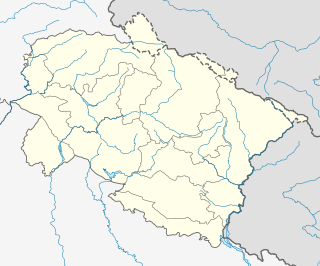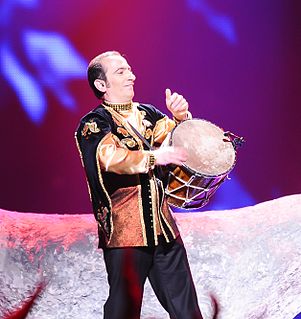Bhaṅgṛā is a type of upbeat popular music associated with the Punjab region in the northern part of the Indian subcontinent, and the Punjabi diaspora in Europe and North America.

The dholak is a South Asian two-headed hand-drum.

Thali is the Indian name for a round platter used to serve food. Thali is also used to refer to an Indian-style meal made up of a selection of various dishes which are served on a platter. The 'thali' style meal serving is popular in India, Nepal, Bangladesh, Fiji, Sri Lanka, Mauritius, Thailand, Malaysia and Singapore.
Pappu Sain is a sufi dhol player. He performs every Thursday evening at the Tomb of Shah Jamal in Ichhra, Lahore, Pakistan.

The davul or atabal or tabl is a large double-headed drum that is played with mallets. It has many names depending on the country and region. These drums are commonly used in the music of Middle East. These drums have both a deep bass sound and a thin treble sound due to their construction and playing style, where different heads and sticks are used to produce different sounds on the same drum.

Music of Punjab reflects the traditions of the Punjab region of the Indian subcontinent, currently divided into two parts: East Punjab (India) and West Punjab (Pakistan). The Punjab has diverse styles of music, ranging from folk and Sufi to classical, notably the Patiala gharana.

The music of Himachal Pradesh a state of India located in the northwest corner of the country, includes many kinds of folk songs from the area, many of which are sung without accompaniment.

Folk music of Haryana has two main forms Classical Folk Music of Haryana and Desi Folk Music of Haryana, and they take the form of ballads and pangs of parting of lovers, valor and bravery, harvest and happiness.

Indian folk music is diverse because of India's vast cultural diversity. It has many forms including bhangra, lavani, dandiya, Sufi folk rock, and Rajasthani.

Johnny Kalsi is a British Indian dhol drum performer residing in London. He rose to prominence as a former member of Transglobal Underground and the founder of the Dhol Foundation. He also is a member of the Afro Celt Sound System and The Imagined Village.

Berinag, is a hill station, located 160 km from Nainital in the Pithoragarh district, which is the easternmost Himalayan district in the state of Uttarakhand, India. It is one of the six Administrative Subdivisions (tehsil) of Pithoragarh. National Highway 309A passes through Berinag. Closest prominent villages include Garawon, Dhanoli, Bana, Bhattigaon, Banoli, Quarali, Tripuradevi and Sangarh.
A dohol is a large cylindrical drum with two skin heads. It is generally struck on one side with a wooden stick bowed at the end, and with a large thin stick on the other side, though it is also played with the bare hands. It is the principal accompaniment for the Sorna. A similar instrument, the Dhol, is used in traditional Egyptian, Pakistani and Indian music.

"Nagada Sang Dhol" is a Garba song from the 2013 hit Bollywood film, Goliyon Ki Raasleela Ram-Leela. Composed by Sanjay Leela Bhansali, the song is sung by Shreya Ghoshal and Osman Mir, with lyrics penned by Siddharth-Garima. The song features Deepika Padukone, Ranveer Singh and Supriya Pathak in the video.
Caucasian Dhol is a kind of dhol drums in the Caucasus. This drum was used by the Caucasian warriors in the battle, today for national music playing.
Puja thali or Puja plate is a tray or a big container in which the entire puja materials accumulated and decorated. In Hindu religious occasions, festivals, traditions and rituals, puja thali maintains an auspicious role. Puja thali may be made of steel, gold, silver, brass or any other metal; it may be rounded, oval or any other shaped or with little engravings and designs as much as decoration needed. Puja thali may be costly or cheaper but puja accessories are more or less same.

The Qoltuq nagara(Armpit drum) is a folk drum with double head that is played on one side with the bare hands. It is used in Armenia, Turkey, Iranian Azerbaijanis, Azerbaijan Georgia and other Caucasus regions. It has different names, according to the territory in which it is played. This membranophone is different from the dhol and nagara of India.
Thali is a type of South Asian meal.
Garland Encyclopedia of World Music (Book 5). Routledge; Har/Com edition (November 1999). ISBN 978-0824049461










